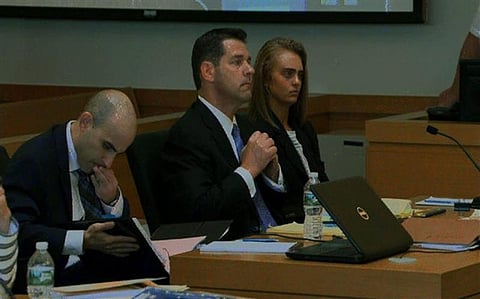
- HOME
- OPINION
- ON GROUND
- INTERVIEW
- INDIA
- NewsGram USA
- WORLD
- न्यूजग्राम
- POLITICS
- ENTERTAINMENT
- CULTURE
- LIFESTYLE
- ECONOMY
- SPORTS
- Jobs / Internships
- Misc.
- NewsGram Exclusive

New Delhi, August 5, 2017: Michelle Carter, the young woman convicted of involuntary manslaughter, has been sentenced to a two and a half year term including 15 months in prison in a Massachusetts jail on Thursday for urging her boyfriend, Conrad Roy III, to commit suicide through text messages in 2014.
The case against Carter became something of an unusual experiment for the American judicial system, which has never witnessed anything like this before.
Carter, now 20, was charged over the 2014 death of 18 year old Conrad Roy III, who she called her boyfriend. The police found Roy dead of carbon monoxide poisoning in his truck, in a Kmart parking lot in Fairhaven, Massachusetts. His death was first deemed as suicide, but the US court decided that Carter was to blame.
Roy was depressed for long, but it was in the summer of 2014, that he started sending Carter messages about his plans to kill himself. Carter, in the beginning, suggested him to take help, however, she later started bombarding him with dozens of text messages sending him encouraging texts to kill himself.
"Don't be scared. You already made this decision and if you don't do it tonight you're gonna be thinking about it all the time and stuff all the rest of your life and be miserable," Carter wrote in one text.
"It's OK to be scared and it's normal. I mean, you're about to die," she wrote in another.
If she had a clear intention for why she did this, or it was the mental issues she was facing that made her do something like that is uncertain. However, different parties have different opinions concerning the same.
Prosecutors believed that Carter wanted to play the role of the "grieving girlfriend" in order to receive the public's sympathy.
Carter, at the time she was texting Roy, struggled with body image issues and was on medicines for depression and anxiety. "She was enmeshed in a delusional system," psychiatrist Peter R. Breggin told The New York Times.
'I don't want to say any more about her beyond that she doesn't have a conscience,' Lynn Roy, mother of Conrad Roy told Daily Mail.
In the coming months, when the police started investigating Roy's death, the involvement of Carter became evident by the conversations she had with Conrad through text messages, which made it apparent that she encouraged him to take his life. On July 12, 2015, A Massachusetts judge charged Carter with involuntary manslaughter for the same.
"Knowing that Mr. Roy is in the truck, knowing the condition of the truck, knowing or at least having a state of mind that 15 minutes would pass, Ms. Carter takes no action," Judge Lawrence Moniz said to the court.
Carter's case has surprised many legal experts, spawning legal debates across the United States, in fact, the world. Many of them felt that Carter's distance from Roy at the time of death would help bring forth a not-guilty ruling. But this decision is, indeed, important to establish precedent in future cases of people telling others to kill themselves.
"This court must and has balanced between rehabilitation, the promise that rehabilitation would work and a punishment for the actions that have occurred," said Bristol County Juvenile Court Judge Lawrence Moniz.
-prepared by Samiksha Goel of NewsGram. Twitter @goel_samiksha
